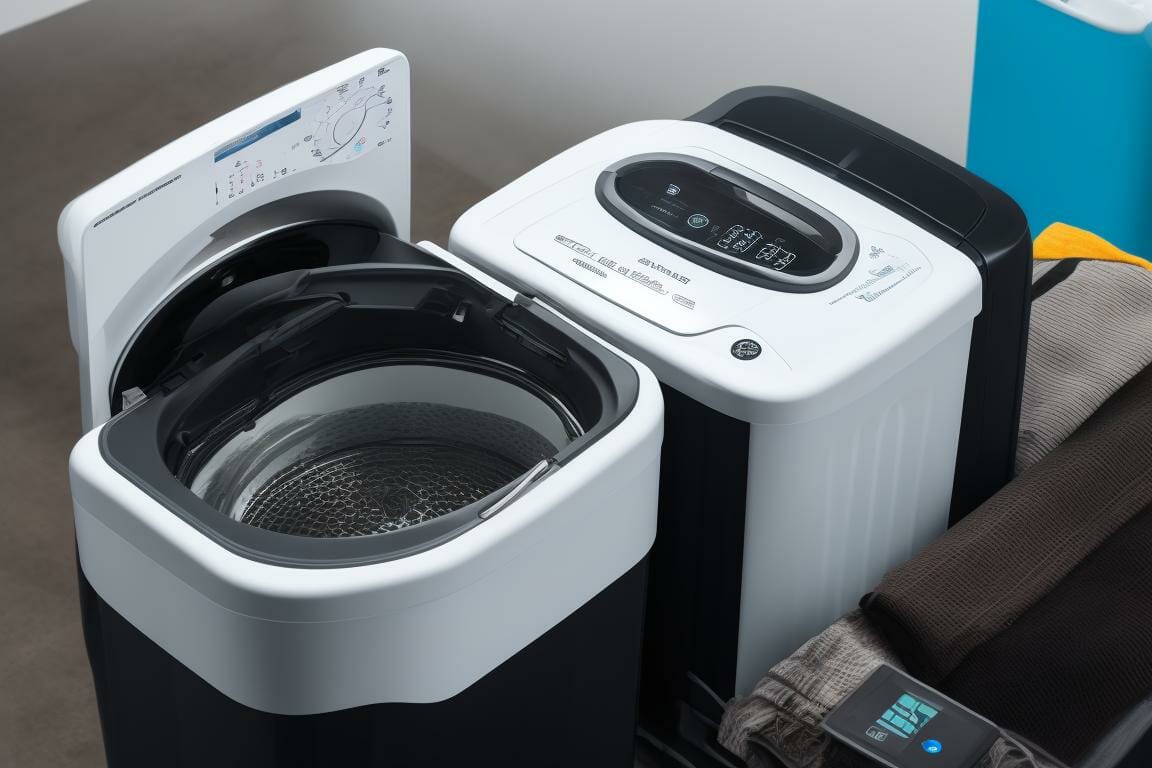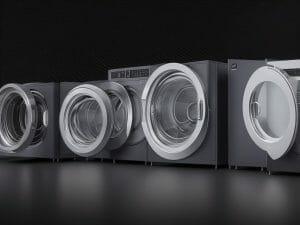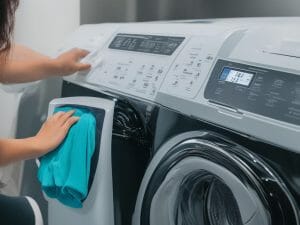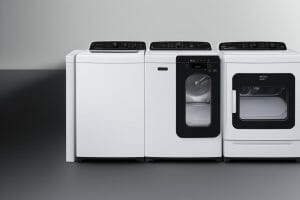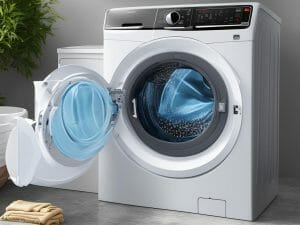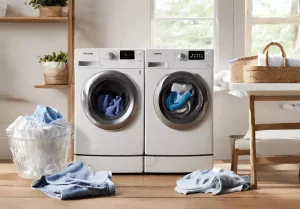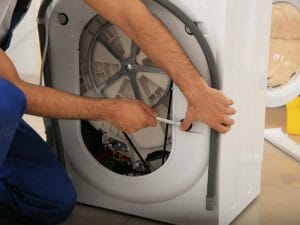Key Features to Look for in a Portable Washer
Are you in the market for a portable washer? Look no further! In this article, we’ll guide you through the key features you should be on the lookout for.
As an appliance expert, I’ll provide you with detailed and accurate information about the functionalities, specifications, and benefits of each feature. You’ll gain the knowledge you need to make an informed decision based on your unique needs and preferences.
So let’s dive into the world of portable washers and find the perfect one for you!
Key Takeaways
Washing Capacity
You’ll want to consider the washing capacity when choosing a portable washer. An appliance expert or home appliance specialist would provide detailed information about the key features of a portable washer, including its washing capacity.
The washing capacity refers to the amount of clothes the washer can hold per load. This is important because it determines how much laundry you can wash at once. Different models have different capacities, ranging from small loads to larger ones. It’s important to choose a capacity that suits your needs. If you have a small household or limited space, a washer with a smaller capacity may be suitable.
However, if you have a larger family or need to wash bulkier items, a washer with a larger capacity would be more efficient. Remember to follow the manufacturer’s recommendations for portable washer maintenance and cleaning instructions to ensure its longevity and optimal performance.
Energy Efficiency
To ensure energy efficiency, it’s important to consider the power rating and energy-saving features of a portable washer. An appliance expert or home appliance specialist would provide detailed and accurate information about the key features of a portable washer.
They would explain the functionalities, specifications, and benefits of each feature, helping readers make an informed decision. Being knowledgeable about various brands and models, an appliance expert would present a balanced view, without favoring any specific brand or model.
They would objectively evaluate the pros and cons of different features, allowing readers to make their own judgments based on their unique needs and preferences.
When it comes to energy-saving features, here are three important factors to consider:
Water Usage
When it comes to water usage, efficiency is key. Water-saving technology in portable washers can help you conserve water without sacrificing cleanliness. Look for adjustable water settings that allow you to customize the amount of water used for each load, ensuring that you only use as much as you need.
Efficiency of Water Consumption
One important factor to consider in a portable washer is how efficiently it consumes water. When shopping for a portable washer, an appliance expert would highlight certain features that promote water conservation and eco-friendliness.
Here are three key factors to look for:
Water-Saving Technology
Consider a washer that offers adjustable water levels or sensors that automatically adjust water usage based on the load size, ensuring that you only use the necessary amount of water for each cycle.
These smart sensors are a key feature to look for in a portable washer. With these sensors, you can save water and reduce wastage, making your laundry routine more efficient and environmentally friendly.
Many portable washers come with quick wash cycles that allow you to clean your clothes in a shorter amount of time. This feature is perfect for those who are always on the go or have limited time for laundry.
By choosing a portable washer with smart sensors and quick wash cycles, you can have a convenient and water-saving laundry experience.
Adjustable Water Settings
To save water, adjust the water settings on your washer based on the load size and let the smart sensors do the work for you. By doing so, you can effectively reduce water consumption while still keeping your clothes clean.
Here are a few things to consider when adjusting the water settings on your portable washer:
Spin Speed
The spin speed of a portable washer is crucial in determining how quickly and effectively it can remove excess moisture from your clothes. A higher spin speed means that the clothes will be spun faster, resulting in less moisture and shorter drying times.
When choosing a portable washer, it’s important to consider the spin cycle options available.
Here is a breakdown of the spin speed settings commonly found in portable washers:
| Spin Speed | Description | Benefits |
|---|---|---|
| Low | Gentle spin cycle for delicate fabrics | Prevents damage to delicate clothes |
| Medium | Standard spin cycle for everyday fabrics | Balances speed and fabric care |
| High | Fast spin cycle for heavy fabrics | Removes excess moisture quickly |
Noise Level
When it comes to choosing a portable washer, one key consideration is the noise level. As an appliance expert, it is important to inform you about the benefits of silent operation and the advancements in noise reduction technology.
By delving into the technical aspects, such as motor power and energy efficiency, I can provide you with a deeper understanding of the portable washer’s capabilities and limitations in terms of noise reduction.
Silent Operation Desired
If you want a portable washer that operates silently, look for models with noise-reduction features. These features are designed to minimize the noise produced during the washing cycle, ensuring a peaceful and quiet laundry experience.
Here are three key features to consider:
Noise Reduction Technology
Consider models with noise-reduction features if you desire a portable washer that operates silently. An appliance expert would inform you that there are various noise reduction techniques available in portable washers, including noise cancellation technology.
These features are designed to minimize the noise produced during the washing process, providing a quieter experience for you and your neighbors. Noise cancellation technology works by using advanced algorithms to analyze the sound waves and generate an opposite sound wave that cancels out the noise.
This helps in creating a peaceful environment while your clothes are being washed. By incorporating noise reduction techniques, portable washers ensure that you can do your laundry without disturbance, allowing you to feel a sense of belonging in your home.
Portability
To make your life easier, look for a portable washer that’s lightweight and easy to move around. A compact design allows you to fit it in small spaces, making it perfect for apartments or RVs. Imagine effortlessly carrying your portable washer up and down the stairs without breaking a sweat.
Picture the freedom of taking it with you on camping trips or to your vacation home. With its portability benefits, you can have clean clothes wherever you go. The compact design also means it won’t take up much space in your laundry area.
An appliance expert would emphasize the convenience of a lightweight and easy-to-move portable washer. They would highlight its compact design as a key feature, enabling users to enjoy the benefits of portability without sacrificing functionality.
Frequently Asked Questions
Can a Portable Washer Be Used for Larger Loads of Laundry, or Is It Only Suitable for Smaller Loads?
You can use a portable washer for larger loads of laundry, but it may have a smaller capacity compared to traditional washers. However, the benefits of using a portable washer include convenience and versatility.
How Does the Energy Efficiency of a Portable Washer Compare to That of a Traditional Washing Machine?
When comparing the energy efficiency of a portable washer to a traditional washing machine, it’s important to consider the load capacity suitability as well. Portable washers are generally designed for smaller loads, which can contribute to their energy efficiency.
What Is the Average Water Usage of a Portable Washer per Cycle?
On average, a portable washer uses about 8-15 gallons of water per cycle. The cycle duration can vary, but it usually ranges from 15-45 minutes.
Does the Spin Speed of a Portable Washer Affect the Drying Time of Clothes?
The spin speed of a portable washer impacts the drying time of clothes. Higher spin speeds remove more water from the clothes, reducing drying time. Look for a portable washer with adjustable spin speeds for flexibility.
Are Portable Washers Generally Noisier Than Traditional Washing Machines?
Portable washers are generally noisier than traditional washing machines. When comparing noise levels, consider the size of the unit, its motor power, and insulation. Look for models that offer quiet operation for a more peaceful laundry experience.
Conclusion
In conclusion, when looking for a portable washer, it is important to consider key features such as washing capacity, energy efficiency, water usage, spin speed, and noise level.
An appliance expert or home appliance specialist can provide detailed and accurate information about these features, helping readers make an informed decision. They can objectively evaluate the pros and cons of different features, allowing readers to make judgments based on their unique needs and preferences.
Using technical terminology and industry jargon, they can provide a deeper understanding of the product’s capabilities and limitations.

